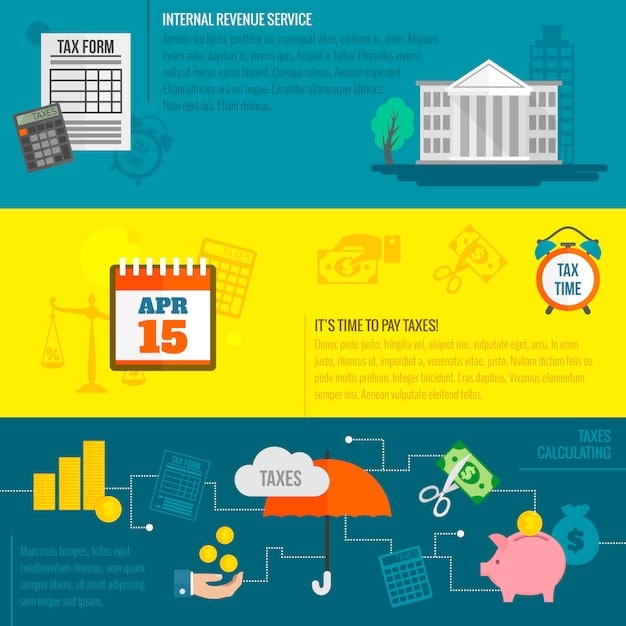How New Tax Laws in 2025 Will Impact Your Finances

How will the new tax law affect your 2025 personal finances? The 2025 tax law introduces changes in income tax rates, deductions, and credits that can significantly alter individual tax liabilities and financial planning strategies.
Navigating the complexities of tax laws can feel like a daunting task. With the recent changes set to take effect in 2025, understanding how will the new tax law affect your 2025 personal finances becomes crucial for every American. Let’s explore these changes and prepare you for a financially sound future.
Understanding the Key Changes in the 2025 Tax Law
The 2025 tax law brings significant changes that will impact various aspects of personal finance. From adjustments in income tax brackets to alterations in deductions and credits, it’s important to understand these shifts to effectively manage your finances.
Adjustments to Income Tax Brackets
One of the primary changes in the 2025 tax law involves adjustments to the income tax brackets. These adjustments can affect how much tax you owe, depending on your income level. It’s essential to review these new brackets to anticipate any changes in your tax liability.
Changes to Standard Deductions
The standard deduction, a fixed amount that taxpayers can deduct from their income, is also subject to change. Understanding how these changes affect your tax situation can help you decide whether to take the standard deduction or itemize.
- Review the new income tax brackets to see how your tax liability may change.
- Compare the new standard deduction with your potential itemized deductions.
- Consider consulting a tax professional for personalized advice.
In summary, the adjustments to income tax brackets and changes to standard deductions are essential aspects of the 2025 tax law, influencing how much tax individuals owe. Be sure to review these aspects of the law carefully to understand how they will affect your personal finances.

Impact on Investment Strategies
The new tax law also has implications for investment strategies. Changes in capital gains tax rates and dividend taxation can alter the after-tax returns on investments, necessitating a review of your portfolio.
Capital Gains Tax Rates
Capital gains tax rates, which apply to profits from the sale of assets like stocks and bonds, may change under the new tax law. Understanding these changes is vital for investors looking to optimize their returns and minimize their tax liabilities.
Taxation of Dividends
The taxation of dividends, which are payments made by companies to their shareholders, may also be affected. Knowing how dividends will be taxed can influence investment decisions and the overall profitability of your portfolio.
The changes in dividend and capital gains taxes can change your investment outcomes. Evaluating your portfolio based on the new law can reduce any surprises when tax season arrives.
How the New Tax Law Affects Homeowners
Homeowners may experience noticeable impacts from the 2025 tax law, especially concerning mortgage interest deductions and property tax deductions. Understanding these changes can significantly influence the financial benefits of owning a home.
Mortgage Interest Deductions
The new tax law may alter the rules around mortgage interest deductions, which allow homeowners to deduct the interest they pay on their mortgage. Changes to these deductions can affect the overall cost of homeownership.
Property Tax Deductions
Property tax deductions, which enable homeowners to deduct a portion of the property taxes they pay, may also be modified. These changes can impact the financial attractiveness of owning property, particularly in areas with high property taxes.
- Assess how the changes to mortgage interest deductions affect your tax liability.
- Evaluate the impact of property tax deduction changes on your overall financial planning.
- Consult with a financial advisor to optimize your homeowner tax strategy.
In conclusion, changes to mortgage interest and property tax deductions are crucial aspects that homeowners should be mindful of in the 2025 tax law, as they can substantially affect the financial advantages of owning a home. Keeping abreast of these issues is important for effective financial preparation and decision-making.
The Role of Tax Credits in the New Legislation
Tax credits play a significant role in the new tax legislation, offering targeted incentives for specific activities and demographics. These credits can directly reduce your tax liability, providing substantial financial relief.
Changes to Child Tax Credit
The Child Tax Credit, which provides a tax benefit for families with qualifying children, may see adjustments under the new law. Understanding these changes is essential for parents planning their finances.
Adjustments to Education Credits
Education credits, such as the American Opportunity Tax Credit and the Lifetime Learning Credit, may also be revised. These credits help offset the costs of higher education, and any changes can impact students and their families.
Tax credits are an important financial relief tool. Make sure to factor child and education tax credits into your financial strategy.
Strategies for Minimizing Your Tax Liability
Minimizing tax liability involves proactive planning and strategic financial decisions. Utilizing tax-advantaged accounts and optimizing deductions can help reduce the amount of tax you owe.
Using Tax-Advantaged Accounts
Tax-advantaged accounts, such as 401(k)s, IRAs, and HSAs, offer ways to save for retirement, healthcare, and other goals while reducing your current tax liability. Utilizing these accounts effectively can lead to significant tax savings.
Optimizing Deductions and Credits
Optimizing deductions and credits involves identifying all eligible deductions and credits and strategically using them to lower your tax bill. This includes itemizing deductions when beneficial and claiming all available credits.

- Contribute to tax-advantaged accounts to reduce your taxable income.
- Keep detailed records of expenses to maximize deductions.
- Consider hiring a tax professional to identify all available credits and deductions.
By using these tips, you can make more informed decisions about your investments, leading to a favorable outcome for your 2025 finances. By carefully examining the provisions of the 2025 tax law and seeking qualified assistance when needed, you can maximize your tax benefits and effectively plan for your financial future.
Seeking Professional Advice and Resources
Navigating the new tax law can be complex, and seeking professional advice and resources can provide clarity and guidance. Financial advisors and tax professionals can offer personalized advice tailored to your unique financial situation.
Consulting Financial Advisors
Financial advisors can help you understand the impact of the new tax law on your investment strategies and overall financial plan. They can provide recommendations to optimize your portfolio and minimize your tax liability.
Utilizing Tax Professionals
Tax professionals can assist with tax preparation and planning, ensuring that you are taking advantage of all available deductions and credits. They can also help you navigate complex tax situations and avoid potential pitfalls.
Working with financial advisors and tax professionals can bring clarity to your financial status. By seeking professional advice, you can ensure that you are well-prepared for the changes brought about by the new tax legislation.
| Key Point | Brief Description |
|---|---|
| 💰 Income Tax Brackets | Adjustments in tax brackets affect how much tax you owe based on income level. |
| 📈 Capital Gains Tax Rates | Changes in these rates can impact after-tax returns on investments. |
| 🏡 Mortgage Interest | New rules may affect the benefits of deducting mortgage interest. |
| 👨👩👧👦 Child Tax Credit | Potential adjustments to child tax credit can significantly impact families. |
Frequently Asked Questions (FAQ)
▼
The new tax law changes income tax brackets, potentially affecting your tax liability. Review the new brackets to see how your income will be taxed and plan accordingly.
▼
The standard deduction amount may change, impacting whether you should itemize or take the standard deduction. Compare the new amount with your potential itemized deductions.
▼
Changes in capital gains tax rates and dividend taxation can affect investment returns. Reassess your portfolio to optimize after-tax returns and minimize tax liabilities.
▼
The Child Tax Credit and education credits may be adjusted. Understand these changes to maximize potential benefits for your family.
▼
Utilize tax-advantaged accounts, optimize deductions, and seek professional tax advice. Proactive planning is key to reducing your tax liability.
Conclusion
As the 2025 tax law approaches, understanding its intricacies is essential for effective financial planning. Keeping informed, seeking professional advice, and proactively adjusting your financial strategies will help you navigate these changes successfully. By staying prepared, you can make informed decisions that minimize your tax liability and optimize your financial outcomes.





